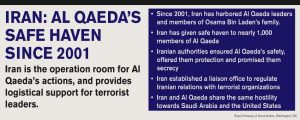In its annual report on terrorism, the US State Department accused Iran of providing a safe haven for senior members of al-Qaeda, like reported by al-monitor.com.
“When you see Iranian fingerprints on so many different terrorist groups around the world, it shouldn’t come as a surprise that Iran would also have connections to al-Qaeda,” said Ambassador Nathan Sales, who leads the State Department’s Counterterrorism Bureau.
Sales told reporters Wednesday that Iran has allowed al-Qaeda operatives to move freely within the country to facilitate the movement of fighters and money into neighboring countries.
“If Iran wants to rejoin the community of responsible nations, here is a start: Crack down on the terrorists that caused 9/11. Crack down on the terrorist proxies that foment violence around the world,” he added.
This isn’t the first time the Donald Trump administration has claimed the Shiite-led country acts as a sanctuary for the Sunni terrorist group. Last October, US Secretary of State Mike Pompeo told the Senate Foreign Relations Committee “there is no doubt” that there is a connection between Iran and al-Qaeda.
Pompeo’s testimony raised questions over whether the administration was building a case to attack Iran by invoking the 2001 Authorization for Use of Military Force. The AUMF is directed at the perpetrators of the Sept. 11, 2001, terrorist attacks — al-Qaeda and its associates.
But to justify the January drone strike in Baghdad that killed Iran’s most powerful military commander, Qasem Soleimani, the administration instead cited the 2002 law that authorized the Iraq war.
The terrorism report, provided annually to Congress, describes Iran’s authorities as “unwilling to bring to justice” senior members of al-Qaeda residing in the country or identify those it is holding in its custody.
“Iran has allowed AQ [al-Qaeda] facilitators to operate a core facilitation pipeline through Iran since at least 2009, enabling AQ to move funds and fighters to South Asia and Syria,” the report said.
Hamza bin Laden, the son of the late al-Qaeda leader Osama bin Laden, is thought to have lived in Iran before he was killed in a US operation in the Afghanistan-Pakistan region in September 2019.
Describing Iran as “the world’s worst state sponsor of terrorism,” the report also listed Tehran’s continued support for armed groups throughout the Middle East, including Hezbollah in Lebanon, Hamas in the Gaza Strip and the Houthi rebels in Yemen.
Iran also backs a number of Shiite militias in Iraq, including Kataib Hezbollah. The United States blames the group for a number of attacks on American interests in Iraq in the past year, including a rocket attack that killed an American civilian contractor at a base near Kirkuk in December and another that left two US service members dead at Camp Taji in March.
The State Department report also said the Iranian regime uses the clandestine foreign wing of the Islamic Revolutionary Guard Corps (IRGC), known as Quds Force, to “provide support to terrorist organizations, provide cover for associated covert operations, and create instability in the region.” In April 2019, the United States designated the IRGC, including the Quds Force, as a Foreign Terrorist Organization.



